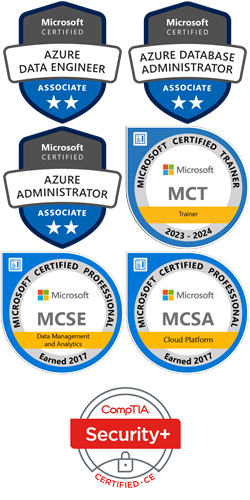This article assumes you already have a basic understanding of SQL Server Audit, but if not, use this link to catch up on all the details. Are you required to have xp_cmdshell enabled on one of your servers? If so, then setup a SQL Audit now to track its use. Never mind the implications of enabling xp_cmdshell, as a DBA you are responsible for what happens on your servers and tracking the use of xp_cmdshell should be a priority. The first step is to create a server audit to hold the events that we collect. You’ll notice that we added a...
Continue reading...
Patrick Keisler
Senior Cloud Solution Architect


Comments, tweets, and posts are my own and do not reflect the views of my employer.

Categories
- Audit (4)
- Availability Groups (4)
- Azure (5)
- Certifications (3)
- Columnstore (6)
- Conferences/Training (7)
- Configuration (8)
- Extended Events (1)
- Idera (1)
- Internals (9)
- Managed Service Accounts (6)
- PASS (7)
- Performance (10)
- Personal (6)
- PowerShell (14)
- Security (7)
- SQL Saturday (3)
- Table Partitioning (2)
- Tools/Utilities (8)
- Troubleshooting (2)
- TSQL Code (13)
- TSQL Tuesday (4)
- VMware (2)
Archives
- December 2024 (1)
- November 2024 (1)
- October 2024 (1)
- December 2023 (1)
- November 2023 (1)
- November 2022 (1)
- March 2022 (2)
- February 2022 (2)
- January 2022 (2)
- December 2021 (1)
- December 2020 (1)
- July 2020 (2)
- June 2020 (2)
- May 2020 (1)
- May 2019 (2)
- July 2018 (1)
- January 2018 (1)
- May 2017 (2)
- April 2017 (2)
- September 2016 (1)
- August 2016 (1)
- June 2016 (1)
- May 2016 (1)
- November 2015 (2)
- October 2015 (3)
- July 2015 (2)
- June 2015 (1)
- April 2015 (1)
- March 2015 (1)
- February 2015 (3)
- August 2014 (1)
- July 2014 (2)
- June 2014 (1)
- May 2014 (1)
- April 2014 (2)
- March 2014 (1)
- February 2014 (1)
- December 2013 (2)
- November 2013 (1)
- October 2013 (1)
- September 2013 (2)
- August 2013 (2)
- July 2013 (2)
- June 2013 (1)
- May 2013 (2)
- April 2013 (1)
- March 2013 (3)
- February 2013 (3)
- January 2013 (4)
- December 2012 (4)
- November 2012 (3)
- October 2012 (5)
- September 2012 (2)

